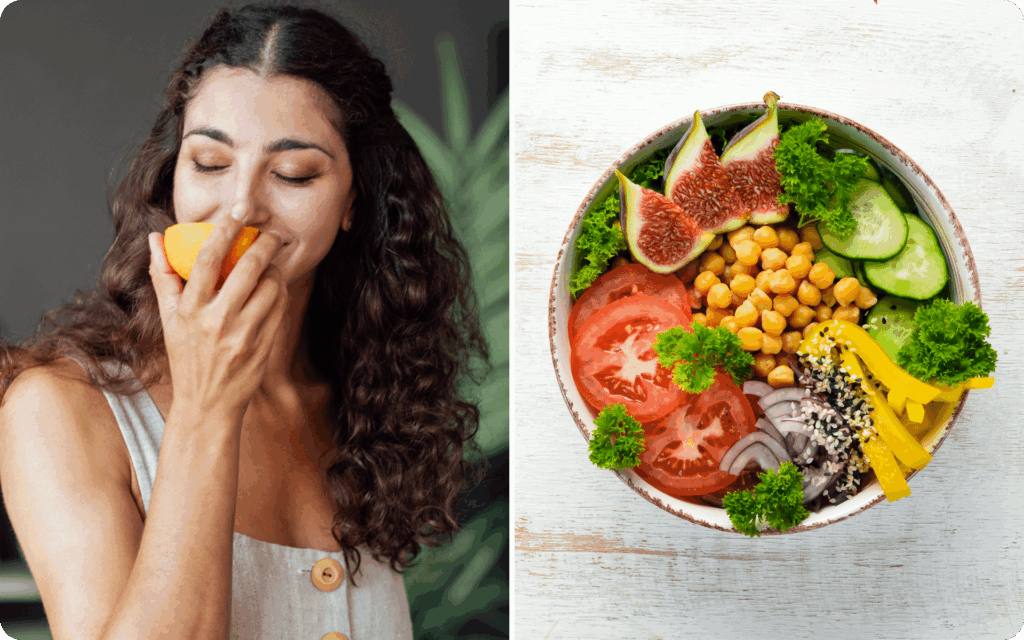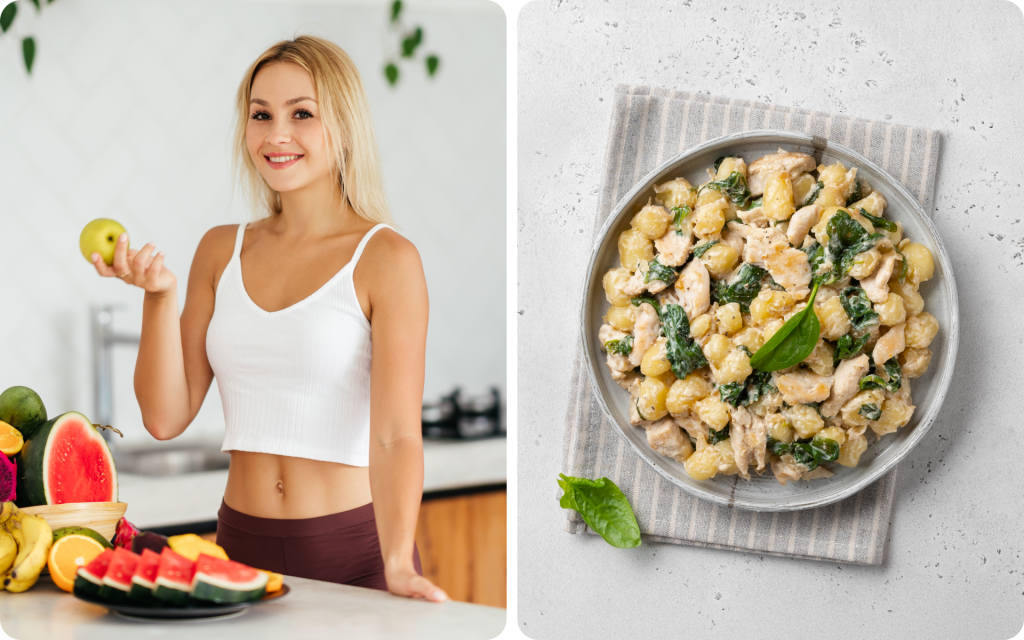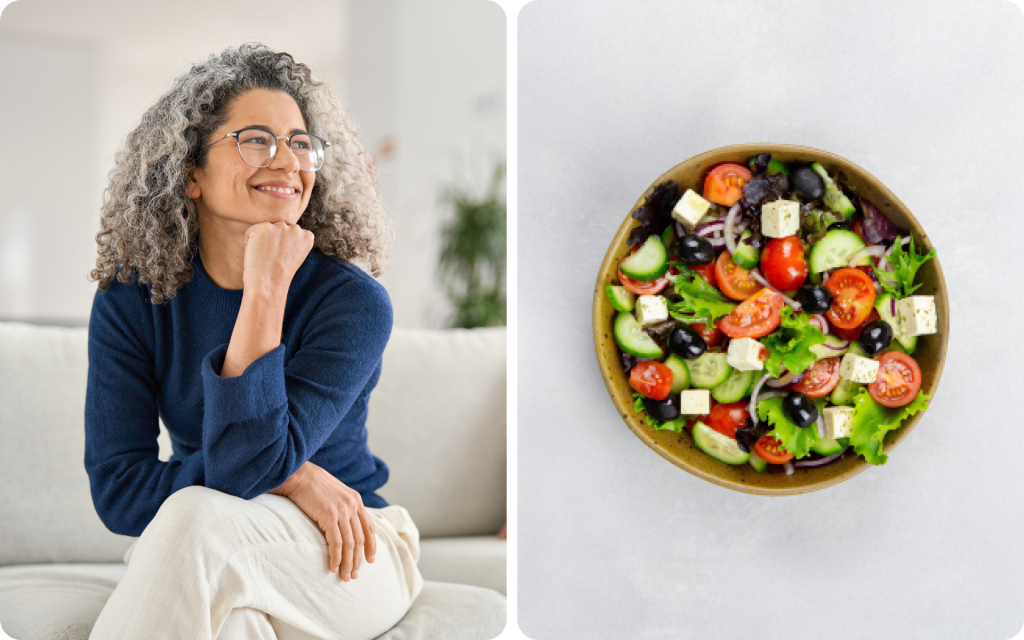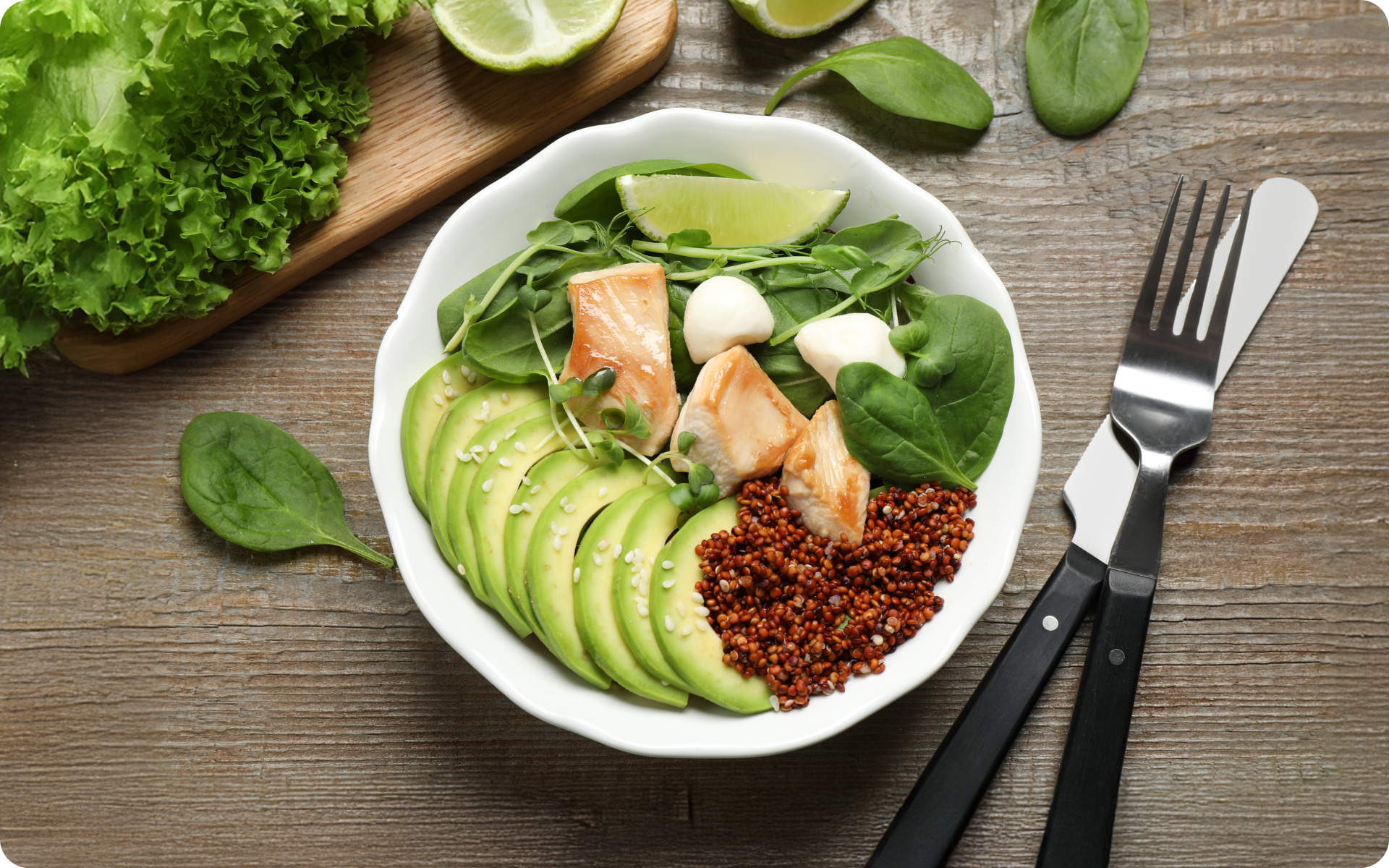What is a transformative 30-day plant-based diet meal plan?
It could be your ticket to a healthier lifestyle. This diet approach is all about embracing plant foods and encouraging you to nourish your body with nutritious, minimally processed ingredients.
Plus, a plant-based diet opens up a world of creativity in the kitchen.
It invites you to explore a variety of flavors and textures, shaking up your usual eating habits. And it’s not just about personal health; this way of eating also promotes sustainability, allowing you to make a positive impact on the environment.
By focusing on whole, plant-based ingredients, you might discover not only a transformation in your physical health but also a deeper appreciation for the simplicity and natural foods.
How To Start A Plant-Based Diet For Beginners?
As we mentioned earlier, a plant-based diet focuses on the intake of foods derived from plant sources, prioritizing nutrient density, quality, and variety of ingredients.
This approach emphasizes the importance of consuming minimally processed foods, allowing you to enjoy a wide array of flavors and nutrients that nature offers (1).
By making these foods the foundation of your meals, you can ensure that you receive a variety of essential nutrients for optimal well-being.
Here are some practical tips to help you embark on a 30-day plant-based diet meal plan for beginners:
- Understand the Fundamentals: It’s essential to understand what a plant-based diet is all about.
You’re cutting out animal products and embracing foods from plants, like fruits, vegetables, whole grains, legumes, nuts, and seeds.
When you focus on these foods, you’re prioritizing nutrients (1).
- Set Realistic Goals: Determine what you want to achieve with this diet and establish attainable objectives. It could be as simple as incorporating more vegetables into your meals or trying new plant-based recipes.
You might explore plant-based diet recipes for beginners that are easy and quick to prepare. This research will help you get familiar with plant-based cooking without feeling overwhelmed.
BetterMe: Health Coaching app helps you achieve your body goals with ease and efficiency by helping to choose proper meal plans and effective workouts. Start using our app and you will see good results in a short time.
- Meal Planning: Planning is key to staying on track. Take a few minutes to plan your meals for the week. This preparation can help you save time and stay focused on your goals.
Consider preparing some dishes in batches and having healthy options readily available for when you’re in a hurry.
- Incorporate Variety and Diversity: A key aspect of enjoying a plant-based diet is variety and diversity. Experiment with different types of grains, legumes, and vegetables to discover new combinations and flavors. Diversity not only makes meals more exciting but also helps you obtain a broader range of nutrients.
- Be Patient and Flexible: Changing your diet is a process. Don’t worry if you don’t get it perfect from the start. Allow yourself to adapt to this new lifestyle and learn from each experience that comes your way.
Read more: How To Make A Whole Food Plant-Based Meal Plan
What Happens To Your Body When You Start Eating Plant-Based?
When adopting a plant-based diet, many people experience significant positive changes in their health and well-being.
One of the most immediate effects might be an increase in energy (2), thanks to the complex carbohydrates found in fruits, vegetables, and whole grains. These foods provide sustained energy and help avoid the sugar spikes associated with highly processed products.
Digestion may also improve considerably due to the high fiber content in plant foods, contributing to better intestinal regularity and a healthy gut.
Additionally, weight loss becomes more accessible, as plant-based diets are often lower in overall calories.
The fiber also helps maintain satiety, reducing the desire to overeat (3).
Furthermore, these changes could lower the risk of chronic diseases such as heart disease and type 2 diabetes. The antioxidants and anti-inflammatory compounds present in plant foods may help protect the body, and the lower saturated fat content is beneficial for heart health (4).
If the eating pattern results in weight loss, that can also reduce the risk of obesity-related chronic diseases.
Many people also report improvements in their mood, attributed to the abundance of nutrients in a diet rich in fruits and vegetables.
Over time, individuals tend to appreciate the natural flavors of foods more, fostering a deeper connection with what they eat. Transitioning to a plant-based diet not only transforms eating habits but also promotes a healthier and more balanced life.
What Can I Eat On A Plant-Based Diet?
A plant-based diet does not mean it is deficient in nutrients; instead, it involves consciously choosing replacements for animal-based foods, ensuring that the diet is full of healthy and nutritious options directly from plants.
To maintain a proper nutritional balance, it is essential to include a diverse range of plant foods that provide all the necessary nutrients.
Some plant-based examples include:
- Fruits: Apples, bananas, strawberries, blueberries, oranges, mangoes, and avocados.
- Vegetables: Spinach, kale, carrots, broccoli, peppers, Swiss chard, cauliflower, and tomatoes.
- Whole Grains: Quinoa, farro, brown rice, oats, barley, millet, and buckwheat.
- Legumes: Lentils, chickpeas, black beans, red beans, and peas.
- Nuts and Seeds: Almonds, walnuts, chia seeds, flaxseeds, and sunflower seeds.
- Dairy Alternatives: Almond milk, soy milk, coconut yogurt, and plant-based cheeses. These options can provide the flavor and texture of dairy products.
- Plant-Based Protein Sources: In addition to legumes, tofu, tempeh, and seitan are excellent alternatives to meat, offering high-quality protein.
- Spices and Herbs: Garlic powder, onion powder, ginger, turmeric, oregano, basil, and cumin to add flavor.
When following a plant-based diet, it is advisable to consult a registered dietitian for personalized guidance and support. A professional can help ensure that you are getting all the necessary nutrients, especially those that are harder to find in plant-based foods, and can also assist you in organizing your plant-based meals.
This professional assistance is critical if you are new to the plant-based diet lifestyle or have specific dietary needs.
What To Avoid On A Plant-Based Diet?
Adopting a plant-based diet is an excellent way to improve health and contribute to environmental sustainability. However, for this diet to be truly effective, it is essential to focus on what to include and what to avoid.
The concept of “plant-based” is not just limited to the elimination of animal products; it also emphasizes the consumption of whole, natural, and minimally processed foods. Practitioners focus on identifying which foods are beneficial and those that may be harmful to our health or simply don’t align with the diet’s philosophy.
Below are some foods and practices that are advisable to avoid to ensure a balanced and healthy plant-based diet:
- Ultra-processed foods: Avoid products that contain a lot of added sugars, saturated fats, and excessive sodium.
- Sodas and sugary drinks: These beverages contain high amounts of added sugar and are generally lacking in essential nutrients. Opt for water, herbal teas, or fruit-infused water to stay hydrated.
- Unhealthy snacks: Many snacks, such as potato chips and commercial cookies, are high in unhealthy fats and added sugars. Look for healthier options, such as fruits or nuts.
- Meats and dairy products: While many plant-based followers often avoid meat and dairy, it’s essential to keep in mind that highly processed vegan alternatives aren’t the best choice either. Read labels to avoid vegan foods with excessive added sugars, salt, and unhealthy fats.
- Refined grains: Limit white bread, white rice, and other refined grains that generally have lost much of their nutrients and fiber. Opt for whole grains, such as quinoa, brown rice, and oats.
It is also important to read food labels to ensure that what you consume aligns with your health goals. By making conscious choices and avoiding the mentioned foods, you could enjoy all the benefits of a plant-based diet, promoting optimal health and overall well-being.
Read more: What Is A Simple Easy Plant-Based Meal Plan For Beginners?
Where Should You Get Protein From On A Plant-Based Diet?
One common concern is how to ensure an adequate intake of protein.
Fortunately, there is a wide variety of plant-based foods rich in protein that can meet our nutritional needs without relying on animal products (5).
It’s essential to diversify your diet to ensure an adequate intake of essential amino acids. Combining different protein sources in a plant-based diet can help provide a complete profile of these amino acids.
For example, pairing legumes with grains (such as quinoa with beans) can provide all the necessary amino acids for optimal health.
By incorporating a variety of these foods into your daily diet, you can ensure that you get enough protein and nourish yourself adequately.
Here are some of the best sources of protein in a plant-based diet:
- Legumes: Lentils, chickpeas, and beans are excellent sources of protein in a plant-based diet. Additionally, there are derivative products, such as legume-based pastas or flours, which offer nutritious and filling options.
- Whole grains: Brown rice, farro, oats, and pseudocereals such as amaranth, buckwheat, and quinoa, provide protein and essential nutrients. Whole-grain products, such as breads and pastas, also fall into this category.
- Nuts and seeds: Almonds and chia seeds are rich in protein and healthy fats.
- Tofu and tempeh: Derived from soy and offer high-quality protein.
It’s essential to read labels when choosing these products. Other soy products, such as edamame and miso, are also good sources of plant-based protein.
- Vegetables: Although vegetables are not as rich in protein as other sources, some, such as spinach, broccoli, and kale, provide significant amounts to complement your primary protein sources.
- Protein powders: For individuals seeking to increase their protein intake, plant-based protein powders, such as those derived from peas, are a valuable option to boost protein consumption.
If you wish to free yourself from all the extra pounds that have been weighing you down for way too long, start using the BetterMe: Health Coaching app and overhaul your entire life!
How Much Weight Can I Lose On 30-Day Plant-Based Diets?
As we have mentioned in other articles on our blog, weight loss could vary significantly depending on several factors. One of the most important is your individual metabolism. Everyone has a different metabolism that influences how quickly they can lose weight. Additionally, other elements such as age, sex, genetics, and body composition also play a key role. Let’s not forget how the body adapts when you make changes to your diet; you may notice fluctuations in your weight initially (6).
Now, let’s talk about exercise. The amount of physical activity you incorporate during those 30 days is crucial. If you stay active and exercise regularly, it will significantly aid you in achieving your weight loss goals and enhancing your overall health (7).
Moreover, to lose weight, you need to create a calorie deficit. This deficit means you should consume fewer calories than you burn (8). Plant-based diets can help with this because they naturally tend to be lower in calories.
However, in general, and considering that your food choices consist of nutritious and minimally processed foods like fruits, vegetables, legumes, whole grains, nuts, and seeds while avoiding ultra-processed foods, if you stick to a healthy path while keeping in mind the caloric deficit and an active lifestyle, you could expect to lose between 0.5 to 1 kilogram (1 to 2 pounds) per week.
So, in 30 days, you could lose between 2-4 kilograms (4-8 pounds) (9).
Remember, it’s always a good idea to consult with a healthcare professional or a registered dietitian before making significant changes to your diet, as this will help you personalize a plan that fits your specific needs and goals.
Why Am I So Hungry On A Whole Food Plant-Based Diet?
Feeling hungry on a plant-based, whole-food diet can depend on several factors.
As we have seen, adopting this type of diet can offer numerous benefits, but it also comes with specific challenges.
Constant hunger can be one of the disadvantages of plant-based dieting; however, ongoing hunger can occur when we ignore a balanced nutrient intake, which can result in nutritional deficiencies.
For example, it is common not to pay attention to adequate protein intake.
Plant-based diets could be lower in calories if not appropriately balanced with sources of protein and healthy fats. Protein is crucial for satiety, and if enough is not included through sources like legumes, tofu, or nuts, you are likely to feel hungrier (10).
The quality of carbohydrates also plays an important role. Some more processed foods might contain refined carbohydrates that cause spikes and drops in blood sugar levels, leading to increased hunger. Opt for complex carbohydrates with fiber and avoid added sugars to maintain stable glucose levels (11).
Finally, the emotional and psychological component also plays an essential role in our perception of hunger. Stress and anxiety could trigger cravings and make you feel hungry even when your body doesn’t need food (12).
If you constantly feel hungry on your plant-based and whole-food diet, review your intake of calories, protein, and carbohydrates to ensure a balanced diet. If you continue to experience difficulties, don’t hesitate to consult a registered dietitian for personalized guidance to ensure your diet meets all your nutritional needs.
What Is An Example Of A Tasty 30-Day Plant-Based Diet Meal Plan?
The following plan is an example of a week of plant-based diet meals, along with tips for maintaining variety throughout the month:
Day 1:
- Breakfast: Cooked oats with banana and walnuts.
- Lunch: Chickpea salad with spinach, tomato, avocado, and olive oil dressing.
- Dinner: Tacos with black beans, pico de gallo, and avocado.
- Snack: Carrots with hummus.
Day 2:
- Breakfast: Spinach, banana, and almond milk smoothie.
- Lunch: Quinoa with roasted vegetables and tahini dressing.
- Dinner: Red lentil curry with brown rice.
- Snack: Apple with almond butter.
Day 3:
- Breakfast: Whole-grain toast with avocado and chia seeds.
- Lunch: Tomato and basil soup with whole-grain bread.
- Dinner: Legume-based pasta with peas, olive oil, and spinach.
- Snack: Mixed nuts.
Day 4:
- Breakfast: Coconut yogurt with homemade granola (made from oats, walnuts, seeds).
- Lunch: Pinto bean burrito, brown rice, and pico de gallo in a whole-grain tortilla.
- Dinner: Tofu stir-fry with broccoli, bell peppers, and soy sauce.
- Snack: Cucumber slices with guacamole.
Day 5:
- Breakfast: Smoothie bowl with berries, banana, and flaxseeds.
- Lunch: Quinoa salad with vegetables, chickpeas, and lemon dressing.
- Dinner: Whole-grain pasta with white beans, basil pesto, and spinach.
- Snack: Homemade energy bars (with dates, nuts, and oats).
Day 6:
- Breakfast: Whole-grain toast with peanut butter and banana slices.
- Lunch: Lentil soup with whole-grain bread.
- Dinner: Chickpea burgers in whole grain buns with lettuce and tomato.
- Snack: Air-popped popcorn.
Day 7:
- Breakfast: Chia pudding with almond milk and fruits.
- Lunch: Roasted vegetable and hummus wrap in a whole-grain tortilla.
- Dinner: Cauliflower crust pizza with tomato sauce and vegetables.
- Snack: Dried fruits and nuts.
Throughout the month, you can mix and match your meals in creative ways.
For example, try varying your legumes, grains, and vegetables. Consider colorful salads with proteins like tofu, tempeh, or chickpeas, or try soups made from peas or squash.
You can alternate between rice, quinoa, farro, and barley as a base for your dishes, as each offers its own flavor and nutrients. Plus, feel free to add more vegetables and experiment with different cooking methods. Roasting, steaming, or baking are excellent ways to enhance the flavors of your meals.
Don’t hesitate to try new recipes; if you’re looking for more inspiration, you can check out our blog to discover more plant-based breakfast ideas and recipes.
There are plenty of options you will surely enjoy!
A healthy plant-based breakfast can include options such as oatmeal cooked with fruits and nuts, smoothies made with vegetables and fruits with almond milk, or sourdough toast topped with avocado and seeds. Yes, rice is completely acceptable on a plant-based diet. It is a good source of carbohydrates, and you can combine it with legumes to obtain complete proteins, as well as with vegetables and spices to create even more nutritious dishes. Yes, you can eat bread on a plant-based diet! However, it’s preferable to choose more wholesome options, such as whole-grain bread or pseudo-grains such as buckwheat. These options are generally better than white bread because they offer more nutrients and fiber, helping to keep you fuller and more satisfied. Tofu is not classified as a whole food since it is a processed product derived from soy. However, it is not considered ultra-processed and does not need to be avoided in a healthy, balanced diet. For comparison, it has undergone a similar level of processing as cheese. It is a good source of plant-based protein and can fit nicely into a variety of plant-based dishes. Frequently Asked Questions
What is a healthy plant-based breakfast?
Is rice ok on a plant-based diet?
Can I eat bread on a plant-based diet?
Is tofu a whole food?
The Bottom Line
Plant-based dieting goes beyond being just a dietary choice; it is a lifestyle that encourages the consumption of nutritious and minimally processed foods.
By incorporating more fruits, vegetables, whole grains, and legumes into your diet, you may notice improvements in both your health and overall well-being.
This approach also opens the door to culinary creativity, as it offers numerous opportunities to experiment with plant-based ingredients.
The key is to remember that every choice matters. You can start with minor changes, such as adding one plant-based meal a day, and gradually expand your options.
This way, the adaptation process could become more natural and enjoyable.
Exploring a plant-based diet could offer you a new perspective on your food and your habits.
DISCLAIMER:
This article is intended for general informational purposes only and does not serve to address individual circumstances. It is not a substitute for professional advice or help and should not be relied on for making any kind of decision-making. Any action taken as a direct or indirect result of the information in this article is entirely at your own risk and is your sole responsibility.
BetterMe, its content staff, and its medical advisors accept no responsibility for inaccuracies, errors, misstatements, inconsistencies, or omissions and specifically disclaim any liability, loss or risk, personal, professional or otherwise, which may be incurred as a consequence, directly or indirectly, of the use and/or application of any content.
You should always seek the advice of your physician or other qualified health provider with any questions you may have regarding a medical condition or your specific situation. Never disregard professional medical advice or delay seeking it because of BetterMe content. If you suspect or think you may have a medical emergency, call your doctor.
SOURCES:
- A Look at Plant-Based Diets (2021, ncbi.nlm.nih.gov)
- The Impact of Vegan and Vegetarian Diets on Physical Performance and Molecular Signaling in Skeletal Muscle (2021, ncbi.nlm.nih.gov)
- Effect of Plant-Based Diets on Gut Microbiota: A Systematic Review of Interventional Studies (2023, ncbi.nlm.nih.gov)
- Vegetarian and vegan diets: benefits and drawbacks (2023, ncbi.nlm.nih.gov)
- Sustaining Protein Nutrition Through Plant-Based Foods (2022, ncbi.nlm.nih.gov)
- Evidence-based weight loss interventions: Individualized treatment options to maximize patient outcomes (2021, pubmed.ncbi.nlm.nih.gov)
- Healthy strategies for successful weight loss and weight maintenance: a systematic review (2014, pubmed.ncbi.nlm.nih.gov)
- Impact of calorie restriction on energy metabolism in humans (2025, pmc.ncbi.nlm.nih.gov)
- Rate of weight loss can be predicted by patient characteristics and intervention strategies (2011, pmc.ncbi.nlm.nih.gov)
- Dietary protein – its role in satiety, energetics, weight loss and health (2012, pubmed.ncbi.nlm.nih.gov)
- Ultra-processed foods. What are they and how do they impact diabetes? (2022, diabetesaustralia.com.au)
- Stress and Eating Behaviors (2014, pmc.ncbi.nlm.nih.gov)


















